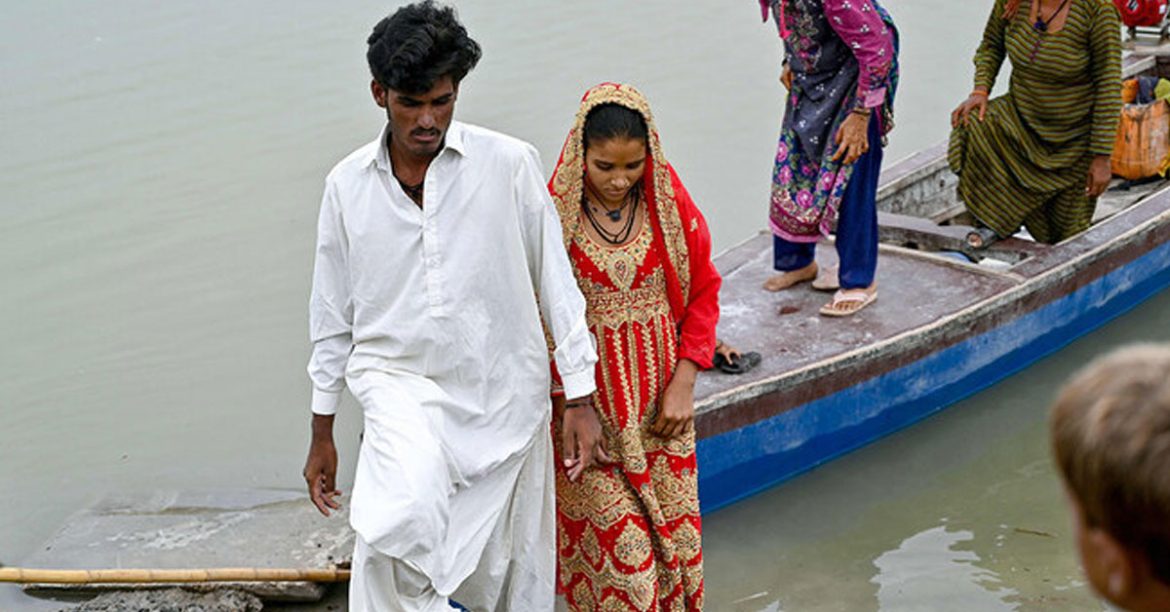The monsoon season, often synonymous with hope and life in many parts of the world, takes on a dark and harrowing significance in the provinces of Sindh and Balochistan in Pakistan.
Here, the season’s heavy rains and accompanying floods are not only a cause of widespread destruction but also a time when the lives of many young girls are upended.
They are often sold off as “Monsoon Brides” in exchange for money—a tragic phenomenon driven by the desperate circumstances of their families.
The Impact of Monsoon on Rural Communities
In rural areas of Sindh and Balochistan, agriculture and livestock are the primary sources of livelihood for many families. However, the monsoon rains, which are supposed to bring prosperity, frequently bring devastation instead. The torrential downpours often lead to massive flooding, destroying crops, killing livestock, and sweeping away homes. The financial burden of rebuilding, coupled with the loss of income from agriculture, leaves many families in dire straits.
Also Read:
Aftermath of 2022 Balochistan Floods: Fathers Forced to Sell Minor Daughters
The Emergence of “Monsoon Brides”
Faced with the economic ruin caused by these natural disasters, some families resort to the heart-wrenching decision of selling their young daughters into marriage. These so-called “Monsoon Brides” are often minors, sold to older men, sometimes for a paltry sum that the family uses to rebuild their lives after the monsoon’s devastation.
The practice is particularly prevalent in Sindh and Balochistan, where poverty, lack of education, and deeply entrenched patriarchal norms make young girls vulnerable to such exploitation. The financial desperation caused by the monsoon season exacerbates these vulnerabilities, leading to an increase in such cases during and after the rainy season.
Also Read:
Actress Nimra Khan Reveals Shocking Details of Attempted Abduction in Karachi
Socio-Economic Factors at Play
The sale of “Monsoon Brides” is not merely a byproduct of the monsoon but is rooted in the socio-economic fabric of these regions. In many cases, these marriages are arranged to settle debts or to provide a quick influx of cash to a family in crisis. The practice is illegal under Pakistani law, which sets the minimum age for marriage at 16 for girls and 18 for boys, but enforcement is weak in rural areas.
Moreover, cultural norms often dictate that girls are seen as economic burdens, making them more susceptible to being treated as commodities. The dowry system, although officially banned, is still prevalent, and the exchange of money for a bride is often seen as a transaction that benefits the entire family.
Legal and Human Rights Implications
The sale of young girls as “Monsoon Brides” is a clear violation of their human rights. These girls are often denied the right to an education, the right to choose their spouse, and the right to live a life free from exploitation. International organizations, including the United Nations, have condemned child marriage and the sale of children for marriage as forms of modern slavery.
Despite these condemnations, the practice persists, largely due to the lack of awareness, weak enforcement of existing laws, and the overwhelming poverty that drives families to such desperate measures.
The Need for Intervention
To combat the rise of “Monsoon Brides,” there is an urgent need for both immediate and long-term interventions. In the short term, emergency relief during the monsoon season can help alleviate the economic pressures on families, reducing the likelihood that they will resort to selling their daughters. Long-term strategies must focus on education, economic empowerment, and legal enforcement to break the cycle of poverty and exploitation.
International and local NGOs, as well as the Pakistani government, must work together to provide support to vulnerable communities, promote awareness about the rights of girls, and enforce laws that protect them from being sold into marriage.
